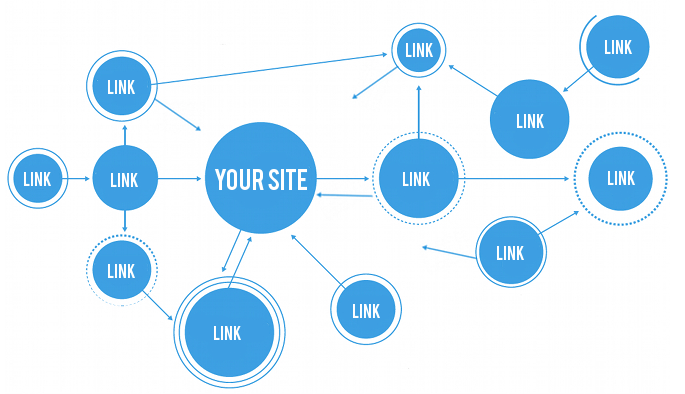Backlinks refer to links that are directly pointing back to your website. Having more backlinks indicate the popularity and the importance of your website to the visitors. Since backlinks have been fully abused by many unethical SEO marketers back then, it is no surprise that Google is putting less emphasis on link building anymore.
A backlink for a given web resource is a link from some other website (the referrer) to that web resource (the referent). A web resource may be (for example) a website, web page, or web directory.

A backlink is a reference comparable to a citation. The quantity and sources of backlinks for a web page are among the factors that Google’s PageRank algorithm evaluates in order to estimate how important the page is. The PageRank score is, in turn, one of the variables that Google Search uses to determine how high a web page should go in search results. This weighting of backlinks is analogous to citation analysis of books, scholarly papers, and academic journals.
Let Your Backlinks Live in Clean Neighborhoods
Focus your efforts on getting backlinks from sites that have high standards.
If they are linking out to “scammy” industries, then you do not want your link to live there.
Examine every prospective website and ask:
- What are they linking out to?
- Are the outbound links relevant?
- Are the outbound links going to respected, trusted sites?
If you see “viagra” or “gambling” or anything of that nature, then avoid that website.
Untapped Backlink Sources
1. Give Testimonials
2. Find Golden Link Opportunities From “Best Of” niche related Blog Posts
3. Niche Related Blogger Blog Comments
4. Niche Related Link Roundups
5. Niche Related Link Reclamation
6. Create (And Promote) a Scholarship
7. HARO (short for Help a Reporter Out)
8. .Edu Resource Backlinks
9. Submit Your Site to Niche Related Website Feedback Sites
10. Submit Your Site to Niche Related Blog Aggregators
11. Find Niche Related Guest Posting Gigs on Twitter
12. Scoop It
13. Business Listings/Citations
14. social media profiles
15. Niche-Targeted Directories
16. Geo-Targeted Directories
17. Niche Relevant Forum Backlinks
- Never submit your site to websites or directories that are not relevant for your topics in any way.
- If links are inside frames, you should not submit your site, because they will steal traffic from you.
- Never submit your blog to blog networks and limit your blogroll to only a handful of sites.
- If somebody offers you a sitewide link, ask them to mark it with the no-follow attribute, so that it doesn’t pass PR, otherwise it may get your site penalized.
- Free linking allowed – you should not add your website on such lists of links that pass PR, when there’s no control on who else appears there.
- Avoid link farms at all costs, because they are easily spotted by Google and all sites that are found there will be penalized.
- Avoid bad neighborhoods such as gambling or porn websites, never link to any of them and never allow them to link to you.
- Three way linking schemes will also get you penalized or even banned from search engines, so avoid becoming part of any such scheme.
- If the site that wants to link to you has other mirror sites, you should not allow it to give you the link, because it may be harmful.
- Don’t submit your site to web directories that aren’t moderated, because you may find yourself in a bad neighborhood, since there’s no control on what else is there on the same page with you.
- Don’t submit to directories that are on interior pages of a web domain, without being linked to from the home page. Most probably these directories and their internal pages won’t be found by search engines, so it would be just a wasted effort from your side.
- Never submit to sites that have coding errors, load very slowly or are full of pop-ups and flashing banner ads pointing to dodgy websites.
- Avoid submitting your site to directories that don’t have some contact information displayed. You may need to remove that link later, if it proves toxic, so you’ll be in trouble if there’s nobody to help you get rid of it.
So there you have it, all of the bad backlinks out there that you should avoid. If you find that these links point to your website then you may want to investigate the potential of a Google Penalty that your website may have incurred. Google penalties, or manual actions, from unnatural or spammy links can negatively impact your search engine rankings but can always be resolved if you take the time to identify the bad links and remove or disavow them. Once resolved your search rankings should recover and your organic traffic should come right back.
